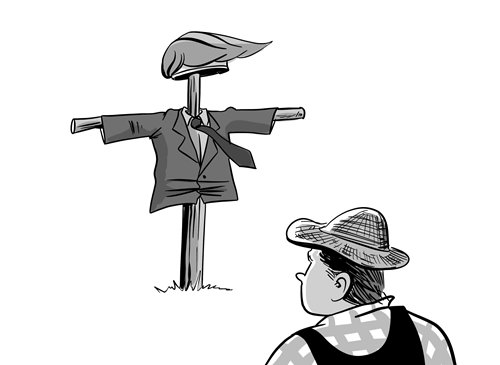COMMENTS / INSIDER'S EYE
US farmers in need of advice after China halts purchases, switching to other producers

Illustration: Luo Xuan/GT
It is more urgent than ever for American farmers to seek planting advice from US President Donald Trump instead of agronomists amid the escalating trade war between the world's two largest economies. Trump, who repeatedly vowed to protect American farmers, should just tell his loyal supporters frankly that they should switch crops if it's not too late because there will be no exports of US agricultural products to China for as long as the trade war drags on.
After Trump threatened last week to impose an additional 10 percent tariff on the remaining $300 billion worth of Chinese exports to the US starting from September 1, China's Ministry of Commerce said that Chinese companies have halted purchases of US farm products. Now the loyalty of American farmers to Trump is facing a real test, as it remains to be seen whether they can afford to lose such a large market as China in the coming years.
So far, Trump has been good at suddenly escalating the trade row with China for reasons he doesn't really understand. According to Trump, he would impose an additional 10 percent tariff on $300 billion Chinese goods because China had not fulfilled its promise to buy large amounts of US farm products. Since July 11, Trump has complained several times that China hadn't started buying US agricultural products. During the G20 Osaka meeting at the end of June, China agreed to buy more US farm goods to facilitate resumed trade talks.
But China quickly dismissed such groundless accusations. According to a CCTV report citing Cong Liang, secretary general of the National Development and Reform Commission, China is honoring agreements signed earlier to import US soybeans. In July, a total of 2.27 million tons of US soybeans had been shipped to China. August is expected to see 2 million tons of US soybeans loaded for China, and there will be another 300,000 tons in September.
Moreover, Cong was quoted in the report as saying that during the period from July 19 to August 2, China purchased 130,000 tons of soybeans, 120,000 tons of sorghum, 60,000 tons of wheat, 40,000 tons of pork and pork products, and 25,000 tons of cotton from the US.
It is not the first time that Trump's claims on the trade battle have been stunning in their recklessness, and American farmers, who bear the cost of such recklessness, have struggled for the past year.
China used to be the biggest buyer of US soybeans in the world, with purchases of 32.9 million tons of US soybeans in 2017. Yet, due to the trade war, Chinese buyers have purchased about 14.3 million tons of soybeans from the US since September 2018, the lowest level in 11 years, according to US data. Moreover, soybean prices plummeted as US stockpiles soared to a record 3.736 billion bushels as of December 1, 2018, according to data from the US Agriculture Department.
According to a report by Politico, US farm debt is expected to reach $427 billion this year, approaching levels not seen since the 1980s farm crisis. Also, in the first three months of 2019, the default rate for farm loans held by banks hit its highest level in seven years.
So far, the Trump administration has offered $28 billion in financial aid to help American farmers get through the difficult times and to compensate for their losses, and this week Trump hinted at more aid if it's necessary.
While the subsidies may bring some temporary relief, the value of the lost market is immeasurable. After all, American farmers cannot rely on subsidies for a living and to support their families in the long run. With the trade war ongoing, US farmers may find some small alternative markets, but it is impossible to find another market as big as China for their products.
In the meantime, farmers in other countries are looking forward to filling the market gap in China. At present, at least nine countries including Brazil, Argentina, Russia, Ethiopia, Kazakhstan, Bolivia, and Ukraine are actively seeking to sell soybeans to China. In late July, China's General Administration of Customs announced approval for soybean imports from Russia and wheat imports from the Kurgan region of Russia.
Under the current circumstances, while trade talks may still resume in September, it would be hard for American farmers to expect much progress from the negotiations or any turnaround in their situation, especially in the short term.
If it's not too late, farmers had better switch crops for the upcoming planting season. As for next season, ask Trump if he's still sitting in the White House.
The author is a reporter with the Global Times. bizopinion@globaltimes.com.cn

